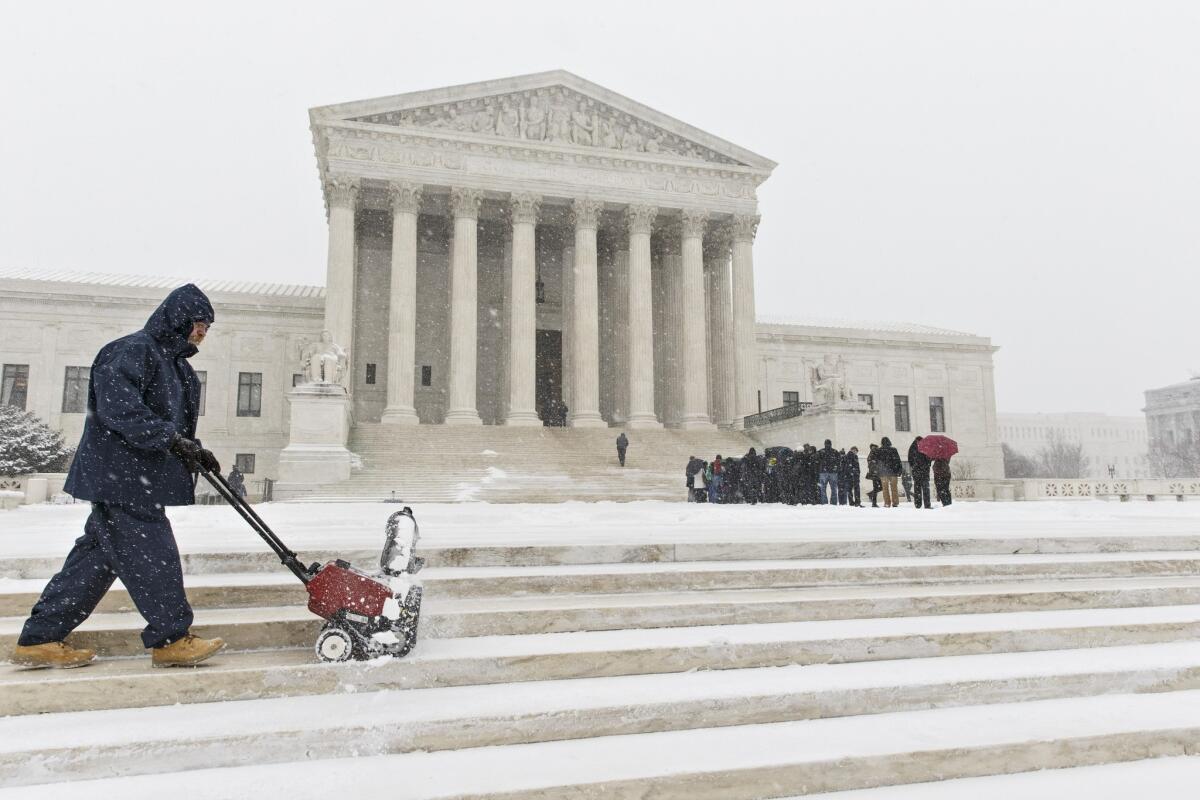High court extends whistle-blower protections to contract workers

WASHINGTON — Outside accountants and lawyers who reveal fraud and wrongdoing at publicly traded companies are protected as whistle-blowers just as employees are, the Supreme Court ruled, expanding the reach of an anti-fraud law passed in the wake of the collapse of companies such as Enron Corp. and WorldCom Inc.
The 6-3 decision Tuesday will affect the mutual fund and financial services industries in particular because they rely heavily on outside contractors and advisors.
Denying whistle-blower protection to all outside employees of such companies would leave a “huge hole” in the 2002 law, said Justice Ruth Bader Ginsburg, noting that most mutual fund companies hire independent investment advisors and contractors rather than employees.
The case involved two long-term contractors at a unit of Fidelity Investments, the nation’s largest mutual fund company, who complained they were dismissed after revealing that the investment firm was inflating its expenses.
Jackie Hosang Lawson, who served as a senior finance director at Fidelity Brokerage Services, alleged the company overstated its expenses by $100 million, thereby padding fees that were charged to investors.
Jonathan Zang, a research analyst, alleged that in some cases, Fidelity operated “veiled index funds” in which the firm collected fees as if the funds were actively managed even though they were not.
“They are like most employees,” said Eric Schnapper, a University of Washington law professor who represented the workers before the Supreme Court. “If they saw something wrong, they wanted to fix it. And they thought the higher-ups should know about it.”
Instead, Schnapper said, the workers were reprimanded and fired.
They sued FMR, Fidelity’s parent, under the Sarbanes-Oxley Act, but a U.S. appeals court panel in Boston ruled before trial that the law’s protection for whistle-blowers covered only employees, not outside advisors and accountants. The law says companies may not “discharge, demote, suspend, threaten, harass or in any other manner discriminate against an employee” who reports fraud or other wrongdoing.
In their appeal, the workers said such a strict interpretation would reimpose “the very code of silence” that enabled massive frauds to occur at companies such as energy giant Enron and telecom firm WorldCom.
Both companies collapsed after investors learned what some of their accountants and advisors had long known: that the companies had set up off-the-books schemes and transactions to hide huge debts.
In Lawson vs. FMR, the Supreme Court ruled that Congress meant to broadly protect whistle-blowers who step forward to reveal wrongdoing. It makes no sense, Ginsburg said, to think “a Congress, prompted by the Enron debacle, would exclude from whistle-blower protection countless professionals equipped to bring fraud on investors to a halt.”
Chief Justice John G. Roberts Jr. and Justices Antonin Scalia, Clarence Thomas, Stephen G. Breyer and Elena Kagan agreed.
Stephen Kohn, executive director of the National Whistleblowers Center, called the ruling a “big win for corporate whistle-blowers.”
“The court has put an end to the popular shell game which large companies use to try to silence whistle-blowers,” Kohn said.
But a spokesman for Fidelity said the suits had not gone to trial yet.
“The allegations were unfounded when they were made, and they continue to be unfounded today,” said Vincent G. Loporchio, a senior vice president for media relations. “Fidelity has long offered employees a number of channels through which to report potential issues,” including a confidential phone line.
In 2010, Congress expanded the whistle-blower provision to offer cash incentives to those who reveal fraud to the Securities and Exchange Commission.
Justice Sonia Sotomayor dissented, insisting the law covered only employees of public companies. “The court’s interpretation undeniably serves a laudatory purpose. But that is not the statute Congress wrote,” she said.
Justices Anthony M. Kennedy and Samuel A. Alito Jr. agreed.
In a separate case Tuesday, the court ruled that a former Los Angeles-area homeowner is due $75,000 under California’s homestead exemption, even if he fraudulently inflated his debts during a bankruptcy proceeding.
A bankruptcy judge in Los Angeles had ruled that Stephen Law’s $75,000 share of the house he once owned in Hacienda Heights must go to Alfred Siegel, a trustee who incurred more than $500,000 in attorney’s fees overcoming Law’s fraudulent misrepresentations. Among other things, the judge said Law created a fake mortgage to fool his creditors.
Reluctantly, the court overruled the lower court. “We acknowledge that our ruling forces Siegel to shoulder a heavy financial burden resulting from Law’s egregious misconduct,” Scalia said, noting that that is what the law demands.
More to Read
Inside the business of entertainment
The Wide Shot brings you news, analysis and insights on everything from streaming wars to production — and what it all means for the future.
You may occasionally receive promotional content from the Los Angeles Times.











